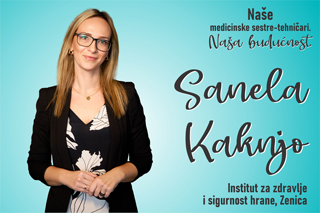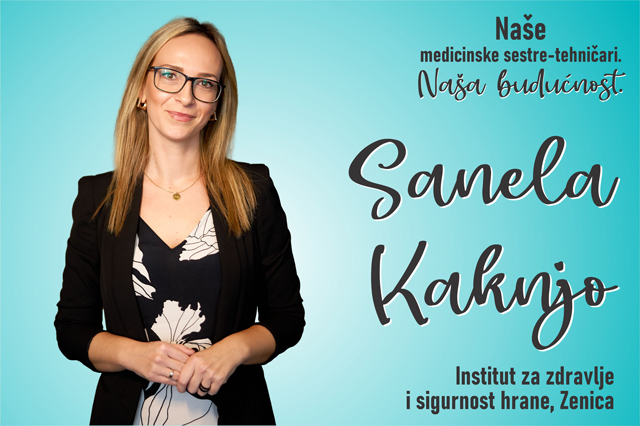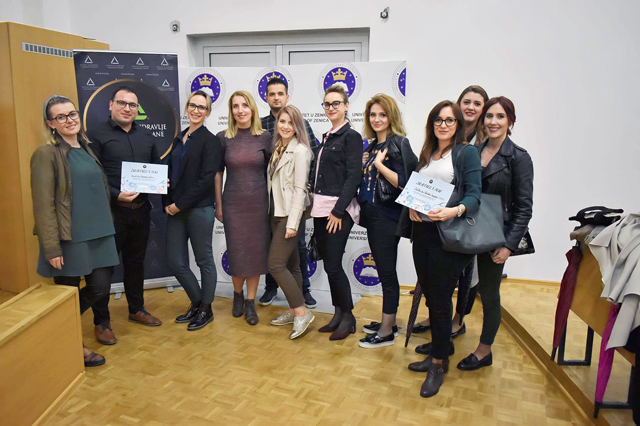
Sanela Kaknjo graduate nurse, a senior nurse at the department for School Hygiene Service at the Institute for Health and Food Safety in Zenica. She started her carrier at the age of 24.
The reason she choose this profession... I chose to attend the nursing high school because it was one of the most promising carriers in town at that time, as it is today, and a fairly sought-after profession. I am glad I chose this profession, and I am inspired by the idea that I can help people in my local community and beyond, and make the world a better and healthier place.
What is missing and what I would change... The lack of legislative regulations that clearly define the implementation of promotional-preventive programs and inspections in educational institutions in our canton and beyond is evident. Besides, I believe that there is no law or regulation that stipulates adequate time and premises to implement this type of health activity in schools. Our department has 16 employees. Although we are mostly working in the field, I would enlarge our service space capacity to correspond to the number of employees and the numerous activities and services we provide.
About the health professionals’ position in Bosnia and Herzegovina... The very fact that many nurses are leaving Bosnia and Herzegovina says a lot about their position. Nurses constitute the vast majority of health professionals in the health system. Unfortunately, we do not look after or try to retain present professionals. The healthcare system is incomprehensible without nurses. Nevertheless, there are still very few who acknowledge and value professionally advanced nurse.
Nurse – patient and nurse – doctor relations... The relations nurse – patient and nurse - doctor are extremely important and most evident in communication and communication skills focused on health outcomes. I believe that quality communication in healthcare is the basis for a partnership between the patient and the healthcare professional, as well as for quality work and the collaboration within entire healthcare team. In order to keep it at high level, it is necessary to work on it throughout the entire carrier. Quality communication and interpersonal relations within the healthcare team are extremely important for the patient because they contribute to a patient's positive attitude towards treatment and towards the healthcare system in whole, leading to a better treatment outcome and trust in medical team involved in patient’s treatment.
Health professionals’ outflow from Bosnia and Herzegovina... Job satisfaction is the foundation to retain the nurses in the country. Job satisfaction is assessed through job description and emotional experience at work. In order to increase job satisfaction and thus prevent the outflow of nurses, it is necessary to change the specific dimensions of the job itself. The specific dimensions include increased earning, better opportunities for the improvement of the profession, career development and advancement, and the recognition by the institution of employment, improved working conditions, improved work organization and communication to achieve healthy productive relationships within the team.
The problems nurses in BiH are faced with... One of the biggest problems is lack of nurses. We do not look after our staff. In many clinics there is one nurse in the night shift covering about thirty patients. Nurses are an equal partner of the healthcare team, but unfortunately they are not equally valued compared to other health professionals. A very few nurses in our healthcare system are involved in the decision-making processes, creation and implementation of health policies.
The importance of trainings organized by the Fami Foundation and relevant entity ministries... I attended by the Fami Foundation and the Federal Ministry of Health provided training in communication skills in healthcare. Given that I am a nurse in the public health sector that has a focus on health prevention and promotion, communication skills play an important role in my work. The communication challenge in public health is to adapt the content to the user or the group we are trying to influence. In the training, I also learned additional skills related to managing stress at work, and made contacts with experts in the field of healthcare for further creation of policies and regulations for the improvement of the healthcare services we provide. I believe that, especially in public health, organizations with a strong communication policy can improve health. I can freely say that now after the training I am more confident communicating with the service beneficiaries and with the team.
The contribution of the Fami Foundation to strengthening nursing... The Fami Foundation through its project activities significantly influenced the advancement and strengthening of the nursing profession, improved service efficiency and availability. The conditions in many health institutions were improved through equipment provision and training facilitation for nurses thanks to Fami Foundation. They encouraged the development of nursing documentation as well as its implementation in practice and worked on standardized operational procedures, thus raising services to a higher level.
A message to future generations that choose this profession... Nursing profession is a vocation that primarily requires empathy, humanity and dedication. We are aware that such a responsible job requires continuous learning, trainings and a sufficient number of nurses to provide quality services. The knowledge and skills of nurses with different levels of education background are necessary for the functioning of a modern society and the healthcare system. On the other hand, nurses need to learn how to use their knowledge effectively along with their expertise and skills. Nurses are the key to providing quality nursing care and raising awareness of the importance of disease prevention. They are always patient’s first contact with the healthcare system. They have a huge role in the health of the community. Investing in the nursing workforce and improving their working conditions, guaranteeing adequate remuneration, will ultimately lead to healthier communities and lower healthcare costs.



